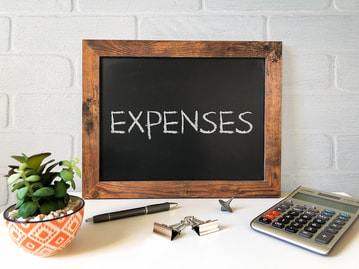4 Ways to Earn Extra Cash During the Holiday
0 Comments
3 Ways to Prepare for a Recession…
We’ve heard the word buzzing around! “A recession is coming; a recession is coming “or some would say that we’re already in one. We wanted to give you some practical tips on things you can do to prepare for this recession. Having a financial plan on how to handle things (even unexpected life events) makes life a little easier. Having a financial plan helps so that you are less likely to make irrational decisions that may be based or guided by emotional responses. Like Benjamin Franklin stated: “If you fail to plan you plan to fail”. Below are a few ways to help you guide your emotions and manage your money! 1.Perform awareness or mind care techniques. This can also help you make better choices with your money. Personally, I’ve dealt with anxiety, so I know that taking the time to do a few breathing exercises, take a walk, or give myself a few minutes of quiet time helps me calm down and regain focus on my spending behavior and money goals. Emotions such as fear can drive people to mismanage their money. This is commonly seen when people are navigating the stock market; when the market is down you notice more people may tend to sell their stocks (usually driven by fear). On a day-to-day basis this could also been seen when a bad storm is being highlighted on the local news station and radio, or when the holidays are approaching. Long lines, bare shelves, huge bills, and empty wallets. Both scenarios drive emotions (fear, doubt, anxiety, etc.) and can affect the way you choose to spend money (Spending Behavior). 2.Develop a Plan for your Money or Test drive the plan that you have. Building a solid financial plan is extremely important; of course, your plan may need to change over time. Planning lets you know where you are currently and gives you a strategy on how to reach your end goal. You can determine how much you need to save to reach your general goals if things shift (life happens). You also need to factor in… what if you get laid off of your job? How will you pay your general expenses? Focusing on preparing for emergencies, security and growth potential is something you should consider when developing a plan for your money. Remember, a real plan will help you prepare for unexpected expenses, protect what you have and highlight growth possibilities to reach your long-term goals. 3.Focus on Spending Less & Earning More. When you’re trying to save or pay bills, figuring out ways you can spend less is the best choice to find money that’s been hiding in your wallet. We’ve had numerous clients who we’ve found money for just by going through some of their spending habits (finding hundreds of dollars). Don’t get caught off guard; plan for the unexpected. We’re here to help you manage your money with individualized plans tailored specifically for you. Book a money goal coaching session with us today! Book A Session Here! Keep in mind LP Consulting & Management are not affiliated with the companies mentioned below.
 Holiday Shopping On A Budget It’s the holiday season, some of us are done shopping and some of us aren’t finished at all. I want to help you shop on a budget, while still offering great gifts without having your pockets crying at the end of the month. People were asking me how I save money during the holiay….so my gift to you will be the 6 Ideas to Holiday Shop on A Budget. Grab your pen and paper write it down, try it, and let us know…. did it work, what was your experience? Do you have other ideas? We want to know! 6 Ideas to Holiday Shop on A Budget:
As we know it, 2020 brought a lot of change in the way things are done. Which has affected everything to how businesses are run, how you apply and interview for jobs to workforce environments. Keeping you aware of the changes as you prepare to enter into the workforce or re enter into the Job hunt is one of our goals.
We’ll it’s a new year and that brings about a Newness that is definitely needed after the 2020 we experienced. Two things that 2020 taught is to:
Family & Finances…. So we wanted to talk about a few ways you and your family could build healthier financial saving habits this year!
Remember these are things that are all temporary but will definitely help you save and prepare you and your family financially for the unexpected. We aren’t claiming or guaranteeing that you’ll be rich, stress free or debt free after doing these things. But we are simply saying that doing these things could potentially help you towards reaching your financial goals! Save Money with Our Sponsors below: goldmineandcoco.com 10% coupon code: BOSS313 Has Your Pay Check mastered the Art of The Great Disappearing Act?
Do you like to many others, get paid on Friday only to wonder how did your check disappear by Monday? Where has my money gone? In the Month of November, we're challenging you, many others, and even ourselves to track your expenses. Let's find out where your money is going and what we need to do to get some of it back! There are of course a ton of ways to track your expenses. You can do it the good ole fashion way by getting pen and paper and writing down how much your spend and what you spend it on. For example: $20 on Gas, or $40 on Take Out (food). Or you could use your phone if you want to go paperless. Most phones have "Notepads" or Memo Pads for you to use to jot down notes. This is a great way to utilize the many apps pre installed on our phones. Or you could look into different apps and companies that offer often Free Expense Tracking Software. Check out these companies below: ExpensePoint TripActions TravelBank Ramp Rydoo Certify Expense Webexpenses Sage Intacct Chrome River Expense Divvy Check out these and let us know which one works best for you! Also at the end of 30 days let us know what did you spend most of your money on? What does the Bulk of your paycheck go towards? In today’s time having a degree is great but it simply isn’t enough. Having a good paying job is awesome but even CEO’s understand the importance of having more than one means of income. Whether you have your dream job, still looking or are still in school finding ways to increase your income is important to helping you reach your financial goals. I want to help you in 2019 “LEVEL UP” your income. Check out the Sites/Links below for opportunities to earn more cash this year: Money Makers Program: https://www.dealsplus.com/m/Lpwilliams198623 This is a great way to take 10-30 minutes out of your day to get paid to post deals and coupon Codes! You get to help other people save money while you make money. When you click the link, sign up for FREE, you get paid $10 as a sign on bonus! English Gardens: https://www.englishgardens.com/about-us/join-our-team This company hires those who have green thumbs! Well not literally but if you’re passionate about helping people or gardening try this company may work well for you. In a busy world working in a Zen garden may be extra work that relaxes you for 2019! CS Evaluator/ BestMark: https://wwww.apply.bestmark.com/?r=MI7246 This company contracts individuals like you and I to go to different companies to evaluate our experience. If you're great with details, have access to a computer, printer, and camera (you can use your phone) copy and past the link and sign up today! You are considered and IC (Independent Contractor) with this company and may be given a 1099-Tax Form if you make over you make $600 a year or more (amount depends on the state you reside in). You can say I referred you by using the Shopper ID#: MI7246 . Investing: https://share.robinhood.com/lorettw42 Investing with Robinhood is very easy and cool to do. Making Money from the comfort of your own bed has never been so easy. Don't have to worry about reports, tracking, and etc. Robinhood lays it all out for you in a cool, easy on the eyes dashboard. Sign up for FREE today! Investing#2: www.acorns.com/invite/6LQ8JQ This second investing opportunity is slightly similar to Robinhood in my opinion however it has more opportunities to earn income. Spending money with your favorite stores allows you to earn money you can use and rounding up to the nearest dollars allows you to invest without worrying about spending tons of $$$ on shares. Acorns also selects the different stocks for you which makes this a no brainier when it comes to investing. These are just a few cool ways to earn extra income this year! Whether your at home, or just need some additional flexible income. Below is a Link to our FREE Live event that will go into more detail on Side Gigs, if they're right for you, Requirements, and how to get started! Just click on: https://2019sidegigs.eventbrite.com New Year Old News! This is the time of the year when we begin to hear about New Year resolutions, goals, promises and Blah, Blah, Blah! Below we’re going to share 5 Tips for “Newbies” on the Job! Tip#1: Dress for the Role you wish to have: Yes, you’re just starting your new position, but if you’re aiming for a higher position even in the future dress for it! Tip#2: Speak up: If there is something that you don’t understand or need help with don’t sit there and fake it! Speak up, ask for help. Take notes, and complete the task. Tip#3: Don’t Mix Personal & Professional: Enough said, keep your work friends at work and keep your personal issues at home. Don’t let your personal problems affect your performance. Tip#4: Delete Distractions: Don’t let Social Media and cell phones determine your fate at your new job. Finish your tasks, keep distractions set aside for your break time. Focus on your Job, distractions will destroy your destiny. Tip#5: Avoid Gossip: I know it’s easy to stick around and chime in on a Slamming Session of Today’s Hot Gossip. You wouldn’t want people talking about you behind your back and you wouldn’t want word to get around that you participated in it. Things in the dark comes out in the light & treat people the way you want to be treated. These 5 tips will help you as you face your new and exciting position at your new job! Steer clear of all things that you wouldn’t be proud of if it was shared with the entire company. Let us know if these tips helped or if you’d like to see more. We want to hear from you! What do you want to see more of? What topics should we discuss, let us know! Email us @ [email protected] |
Details
AuthorThe Education Corner is a collaboration of professional individuals from all walks of life who have started from where you are. Archives
November 2023
Categories |










 RSS Feed
RSS Feed